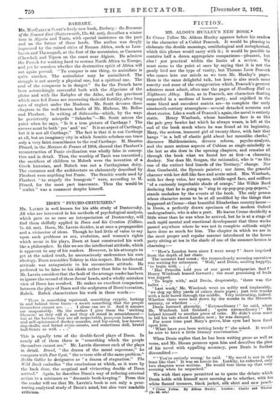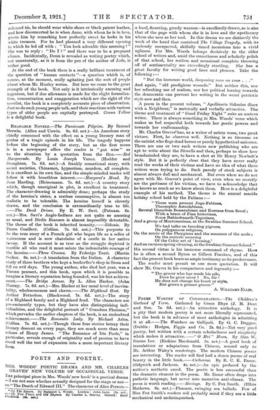FICTION.
MR. ALDOUS HUXLEY'S NEW BOOK.* Ix Crowe Yellow Mr. Aldous Huxley appears before his readers in the character of a Cubist Peacock. It would be pleasing to elaborate the double meanings, ornithological and metaphorical, which this phrase would carry with it ; it would be possible to contrive half a dozen appropriate comparisons—pleasant, but
alas ! not practical within the limits of a review. We must come to the point at once by saying that it is not the gaudy bird nor the type of vanity, but Thomas Love Peacock who comes into our minds as we turn Mr. Huxley's pages. Here is the same delightful talk, but here is also much more suavity and none of the exaggeration which, Peacock's greatest admirers must admit, often mar the pages of Headlong Hall cr Nightmare Abbey. Here, as in Peacock, are characters floating suspended in a medium of house party, and enjellied in the same bland and succulent matrix are—to complete the early nineteenth-century atmosphere—several detached sermons and short stories. Like a work of Peacock's again, the novel is entirely static. Henry Wimbush, whose handsome face is so like the pale grey bowler hat which he always wears, is left at the end of the book much where he was found at its beginning. Mary, the serious, innocent girl of twenty-three, with hair that hangs " in a bell of elastic gold about her moonlike cheeks," discusses Malthusianism, divorce reform, psycho-analysis, and the more serious aspects of Cubism as single-mindedly in the last as she does in the opening chapters, and remains all through the book what we found her at first—a charming donkey. Nor does Mr. Scogan, the rationalist, who is "so like one of the extinct bird lizards of the Tertiary," change. Nor does Gombauld, the Byronic painter ; nor Anne, the graceful charmer with her doll-like face and acute mind. Mrs. Wimbush, with her deep voice, her square, middle-aged face, and coiffure "of a curiously improbable shade of orange," like Wilkie Bard declaring that he is going to " sing in op-pop-pop-pop-popera," stands unshaken by the events of the book. The only person whose character seems to be at all modified by the things that happened at Crome—that beautiful Elizabethan country house— is Denis, a perfectly drawn specimen of the modern Oxford undergraduate, who is also a poet. He leaves Crome decidedly a little wiser than he was when he arrived, but he is at a stage of such rapid mental and emotional development that three weeks passed anywhere where he was not in complete solitude might have done as much for him. The chapter in which we are in the most proper and regular manner introduced to the house party sitting at tea in the shade of one of the summer-houses is charming :—
" How's London been since I went away ' Anne inquired from the depth of her chair. The moment had come ; the tremendously amusing narrative was waiting for utterance. ` Well,' said Denis, smiling happily, ' to begin with . . ' Has Priscilla told you of our great antiquarian find t ' Henry Wimbush leaned forward ; the most promising of buds was nipped. ' To begin with,' said Denis, desperately, ' there was the ballet . .
' Last week,' Mr. Wimbush went on softly and implacably, ' we dug up fifty yards of oaken drain pipes ; just tree trunks with a hole bored through the middle. Very interesting, indeed. Whether these were laid down by the monks in the fifteenth century, or whether . .
Denis listened gloomily. ' Extraordinary ' he said, when Mr. Wimbush had finished ; ' quite extraordinary ! ' He helped himself to another piece of cake. He didn't even want to tell his tale about London now ; he was damped.
For some time past Mary's grave, blue eyes had been fixed upon him. ' What have you been writing lately ' she asked. It would be nice to have a little literary conversation."
When Denis replies that he has been writing prose as well as verse, and Mr. Slocan pounces upon him and describes the plan of his novel with appalling accuracy, poor Denis is further discomfited :—
" ' You're entirely wrong,' he said. ' My novel is not in the least like that.' It was an heroic lie. Luckily, he reflected, only two chapters were written. He would tear them up that very evening when he unpacked."
We wish that space permitted us to quote the debate which Denis holds with himself next morning as to whether, with his white flannel trousers, black jacket, silk shirt and new peach-
• Crome Yellow. By Aldous Huxley. London : Chatto and VIndua t7.. Od. netJ coloured tie, he should wear white shoes or black patent leather, and how disconcerted he is when Anne, with whom he is in love, greets him by remarking how perfectly sweet he looks in his white trousers. For he had planned a very different opening in which he led off with : " You look adorable this morning ! " She was to reply : " Do I I " and there was to be a pregnant silence. Incidentally, Denis is revealed as writing poetry which, not unnaturally, as it is from the pen of the author of Leda, is rather good.
At the end of the book there is a really brilliant treatment of the question of " human contacts "—a question which is, of course, at the moment, really agitating just the sort of people about whom Mr. Huxley writes. But here we come to the great strength of the book. Not only is it intrinsically amusing and ingenious, but if due allowance is made for the slight formaliza- tion, concentration and exaggeration which are the right of the novelist, the book is a completely accurate piece of observation. Just so do suc,h young people talk, and their reactions with various types of older people are capitally portrayed. Crome Yellow is a delightful book.











































 Previous page
Previous page